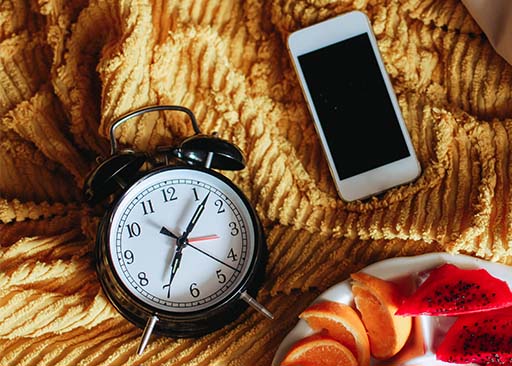Best Time to Sleep and Wake Up [Simple Rules to Follow]

When To Sleep?
There’s no one-size-fits-all answer to when to sleep – it depends on various factors, like the time of day, your sleep schedule, and your overall health. Suppose you find it hard to stick to a specific amount of sleep, experiment, and see what works best for you. Maybe you need to sleep half an hour earlier each day or schedule a sleep-in day once every couple of weeks.
Benefits
There are many benefits to sleeping at the right time. Sleeping in a proper rhythm helps regulate your brain and body functions, making you feel mentally and physically better. Additionally, it has been observed that people who sleep during light hours tend to be healthier than those who sleep during dark hours.
It is because the increase in melatonin production aids in regulating metabolic processes; additionally reduces inflammation throughout the body. Apart from physical health benefits, sleeping optimally also enhances cognitive function due to an increased concentration level and diminished stress levels.
It Depends
There is no one-size-fits-all answer regarding the best time of day to sleep. It depends on your sleeping pattern and needs. Some people are better off going to bed later in the evening, while others need a number of hours in the morning. Some people are better off sleeping in a single session, while others may benefit from splitting their sleep into two or more sessions.
If you’re struggling to get enough rest and feel exhausted all the time, it might be worth considering scheduling a “sleep-in” day every couple of weeks. It will allow you to take advantage of the fact that your body is naturally inclined to drift.
Ideal Time To Go To Sleep
Here are a few general guidelines to help you determine the best time to go to sleep. Some people find that they are most productive and alert in the morning. Others feel best at night after a good night’s sleep. Listening to your body and going to bed when you feel tired is essential.
Another factor to consider is the time of year. People naturally sleep more during colder months and less during warmer months. Therefore, if you are trying to get a good night’s sleep, it might be best to aim for a later bedtime in the fall or winter rather than the summer.
Finally, one crucial factor to keep in mind is your work/life balance. If you can get a good night’s sleep, it will help you feel more alert and productive during the day. However, if you struggle to get a good night’s sleep, try to make changes such as adjusting your bedtime or working out an alternate plan for dealing with work-related stress.
Getting enough sleep is essential for a healthy mind and body. Figuring out the best time to sleep and wake up can be a challenge. The best time to sleep is generally in the evening; however, this isn’t always the case for everyone. Some people may sleep better in the morning, while others may sleep best at night. The best time to sleep is usually when you’re tired.
Consistency
Sleeping at a regular time every night has many health benefits. It is suitable for your sleep cycle and helps you be more productive during the day and have better concentration levels. Melatonin is a hormone that helps regulate sleep and wakefulness. It’s produced more at night, which is why people sleep better.
Sleep Schedule
There’s no denying that sleep is an essential part of our lives. It helps us recharge and focus better during the day and keeps us healthy. A regular sleep schedule is an excellent way to sleep well every night. It means going to bed and waking up at the same time every day, even on weekends! It will help you get enough vital hours of sleep daily to function at your best.
Falling Asleep Naturally
Getting a good night’s sleep is essential for your health and well-being. However, finding the time for bedtime can be challenging. Follow these simple rules to fall asleep at the best time for you: – Stick to a regular sleep schedule by sleeping on weekdays and waking up at the same time each day on weekends. It helps to regulate your body’s natural rhythms and allows you to feel better during the daytime and get more quality sleep at night.


Ideal Time To Wake Up
A few simple rules can help you get the best sleep possible. The first and most important rule is to aim to wake up at the same time every day. This way, you can establish a bedtime routine and sleep schedule that works best for you. Next, aim to have your wake time before the sun rises. It will give you enough time to sleep and enjoy the morning light. And finally, make sure to avoid sleeping in on weekends or holidays. It can disrupt your sleep schedule and make it difficult to wake up on time the next day.
Some people believe that the best time to wake up is when you feel refreshed and energetic. Others may prefer to wake up early to get more work done before lunchtime. Ultimately, what matters most is what works for you.
It’s essential to be aware of your body and how you feel when you wake up. If you find that waking up at a specific time feels too challenging, then it may be better to adjust your schedule. As a result, the best time to wake up depends on your personal preferences and needs.
Sleep Schedule
Sleep is one of the most important aspects of good health, and a regular sleep schedule is crucial for overall well-being. Following a routine that you can stick to even on holidays or vacations will make it much easier to fall asleep with a consistent bedtime and wake cycle. It improves your general health and gives you more energy throughout the day.
Wake Up Slowly
Waking up gradually is more natural for your body, and it helps you get ready for the day in a better way. It also ensures you don’t suffer from sleep deprivation the next day. Here are some tips to help wake up gradually: – Count sheep or cats sleeping in a room to determine your natural internal clock.
Once you know this, adjust your bedtime according to it. – Get up at around the same time every day regardless of how much sleep you got last night. It will help regulate circadian rhythm and reduce grogginess in the morning.
How To Wake Up Earlier
The best way to wake up earlier depends on your personal preferences and routines. You can wake up earlier by setting alarm clocks for a specific day, break the habit of getting out of bed when your body is still groggy and sleepy, and practice meditation or mindfulness before bed to relax. Try to establish a morning routine that includes some form of exercise and healthy eating. It will help you get your body and mind ready for the day ahead, giving you an incentive to wake up earlier.
If you find it difficult to get out of bed, try using alarm clocks that gently wake you up instead of blasting your ears with a loud sound. No matter what methods you use to get up earlier, the most important thing is to start small and gradually increase your time awake each day. With consistent effort, eventually, waking up in the morning will become a habit.
Fall Asleep Fast
There are many ways to fall asleep fast, but one method is by using a sleep aid. A sleep aid helps you relax and fall asleep quickly by providing melatonin or other chemicals that help your body to drift off. Do you sleep soundly? If not, it might be a perfect time to try these tips. First, reduce light exposure before bedtime. It helps you to get better sleep and wake up feeling refreshed. Next, establish an ideal bedtime routine/routine for waking up in the morning.
Breathing Techniques
Sleeping peacefully and soundly is crucial for a healthy mind and body. When you sleep, your brain and body can restore themselves properly. To achieve this, it’s important to practice deep breathing techniques before bedtime. It will help you fall asleep quickly and wake up refreshed in the morning.
Caffeine And Alcohol
It is always a good idea to avoid caffeine and alcohol before bedtime as they can lead to sleep deprivation. It affects both your daytime productivity and sleep quality. Furthermore, caffeine and alcohol disrupt the circadian rhythm, which is crucial for a healthy sleeping cycle. As a result, you might have trouble falling asleep or staying asleep all night.
Keep It Cool
One sleep need is ensuring your bedroom is cool and dark before going to bed for you to sleep well. The body will produce enough of the hormone melatonin, which helps regulate sleep cycles. Cool room temperatures can also help to reduce anxiety and stress.
No Electronics
It is best to avoid using electronic devices or watching television in the hours leading up to bedtime. It will help you get restful sleep and improve your overall quality of life. Blue light emitted from an LCD screen or smartphone computer before bed can make it harder to fall asleep and keep you awake longer in the morning.
Dark And Quiet
One of the best ways to get started with content marketing is by restricting exposure to light and noise. It helps you concentrate better on your work and increase productivity. So, make sure your room is dark and quiet.
Warm Bath
Sleep is essential for our health and well-being. To get a good night’s sleep, it is necessary to relax your body before bedtime. It can be done by taking a warm bath beforehand. Not only will this help you fall asleep faster, but it will also ease your mind and allow you to sleep soundly through the night.

Napping
When taken in the appropriate amount, a short nap can help you to improve your focus and concentration. Additionally, napping has been shown to boost your mood and energy levels. So, if you find it challenging to get enough sleep at night, try taking a quick nap before bedtime.
In addition, make sure the ideal schedule for your nap is for a time when you will not be disturbed.
To nap effectively, people should keep a regular sleep schedule and avoid caffeine and alcohol. They should also avoid working or using electronic devices in the hours leading up to their nap. In addition, people should avoid napping in direct sunlight.
When?
You should keep a few things in mind when it comes to napping. Firstly, avoid naps during hot weather as this can make you more tired and irritable later. Secondly, don’t nap during the afternoon or evening rush hours – when people are usually most active and distracted. Finally, consider your work schedule before sleeping- if you’re generally a light sleeper who needs time to wake up naturally without an alarm clock, try not to nap!
Effective Napping
You must be comfortable and relaxed if you’re looking for the optimal nap time. Make sure everything is in order – your bed should be cozy and dark enough for sleepiness to set in quickly. Avoid taking naps during high-stress periods, as this only aggravates the situation. Instead, take a 20-30 minute power nap when things have calmed down.
Are Naps Good For You?
Some people believe they are essential for restoring energy and improving cognitive function, while others say they can be counterproductive and interfere with nighttime sleep. The best way to determine if napping is right for you is to experiment with different times and lengths of naps to find what works best for your schedule and body.
Some health conditions, such as narcolepsy and obstructive sleep apnea, may require intermittent naps due to their effects on daytime alertness and overall health. Napping can also be a great way to destress and relax before bed. Make sure not to nap too much, as it may result in sleep deprivation the next day.
The Effects
Napping has many health benefits, reducing the risk of developing chronic issues in later life. It has also been shown to improve brain function and make you more alert. If you are taking a nap during the day, make sure that you are not also driving or operating heavy machinery. Additionally, if you nap during the afternoon or evening, it is advisable to avoid eating large meals before bedtime to minimize stomach discomfort caused by sleepiness. If you are considering napping, it is important to talk with a doctor or health care provider first to make sure that it is safe and does not interfere with nighttime sleep.
Tips and Tricks
Getting enough good sleep is essential for a healthy mind and body. But finding the best time to sleep and wake up is a personal decision that can vary. Here are some tips to help you figure it out: – first and foremost, listen to your body and follow your instincts. If you feel tired and groggy in the morning, it’s best to sleep in. Secondly, consider your daily schedule and preferences.
Some people prefer to sleep in on weekends, while others prefer to wake up early on weekdays. – lastly, establish a nighttime routine that includes bedtime rituals and a peaceful bedtime environment. It helps you sleep better and wake up refreshed.
Healthy Habits
Your sleeping habits must be healthy if you want to sleep soundly and wake up feeling refreshed. For starters, make sure to create a relaxing bedtime routine. It might include taking time for yourself before bedtime, reading or listening to calming music, or using relaxation techniques like meditation.
It’s also essential to keep your sleeping environment comfortable and dark enough so that you can drift off quickly and sleep through the night without interruption. Use a quality mattress such as natural materials with anti-microbial agents, which can help reduce odor problems and improve sleep hygiene in the bedroom.
Exercise
Regular exercise is good for your overall health. Not only does it help you lose weight, but it also keeps your body agile and healthy. However, if you’re looking to sleep soundly, ensure that your exercise routine doesn’t disrupt your sleeping habits. Try to work out in the morning or evening when it won’t interfere with your nighttime routine.
Simple Rules
Getting the best sleep possible is essential for your physical and mental health. Follow these simple rules to get the best rest: First, wake up at the same time every day, no matter what. It will soon become a habit, and your body will be used to it by then.
Secondly, keep a regular sleep schedule – this will help regulate your body’s natural rhythm and help you sleep better throughout the night. Thirdly, avoid caffeine during bedtime – stimulant properties can disrupt your sleep pattern. Finally, ensure enough light in bed, so you don’t confuse daytime with nighttime again!
Conclusion

If you are experiencing frequent headaches, neck pain, and difficulty sleeping, it may indicate a problem with your stress levels. BioScan can help to determine if stress is affecting your sleep. It can identify stress patterns that affect how people sleep and what factors may contribute to disrupted sleep. The information can help you find solutions for better sleeping habits and overall health.
